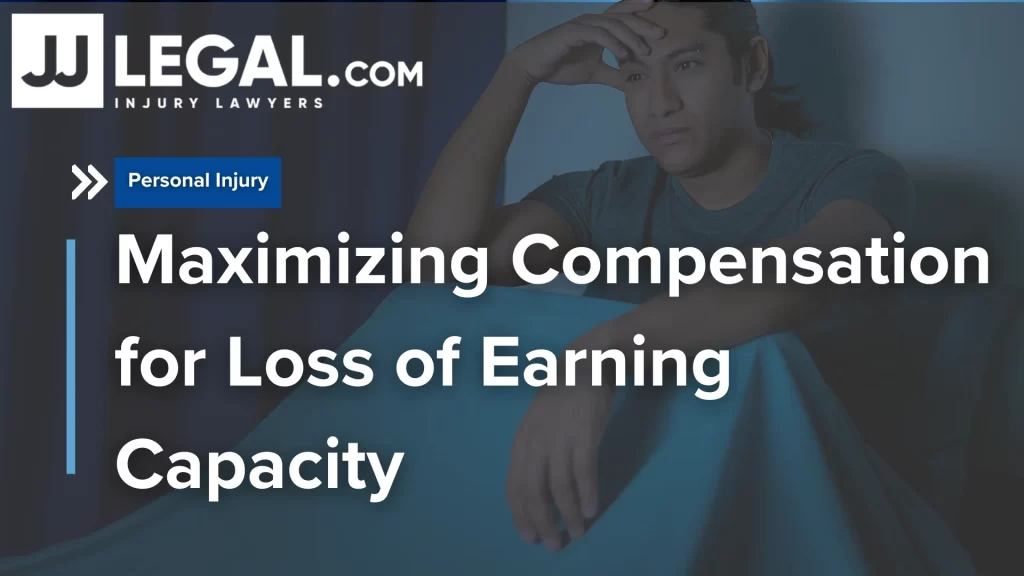
Loss of earning capacity represents the future income you can no longer earn due to an injury. This guide cuts through the complexities to explain how this financial impact is assessed and what it means for your personal injury claim. You’ll learn how to determine the value of lost opportunities and navigate the process of seeking compensation.
Understanding Loss of Earning Capacity
“Loss of earning capacity” is a significant concern for those who suffer an injury that affects their workability. It not only affects their current earnings but also eliminates the potential for future growth. This requires careful evaluation in personal injury cases, including the assessment of future lost earnings.
Defining Loss of Earning Capacity
The concept of lost earning capacity extends beyond the here and now, focusing on the income a person is capable of earning in the absence of injury. It’s not confined to a fixed salary or an hourly wage; it’s an expansive view of an individual’s professional horizon, considering their future earning capacity.
This measure of financial damage is not about actual loss, but rather the capacity lost—the difference between what one could have earned and what one is now limited to earning due to an impairment.
Importance in Personal Injury Cases
Lost earning capacity claims carry high stakes in personal injury law. It’s about securing compensation that reflects the severe financial repercussions of not being able to pursue a career to its fullest potential. Personal injury lawyers aim to accurately assess and maximize this part of a claim to restore the victim’s financial prospects.
Factors Affecting Loss of Earning Capacity
Delving into the complexities of lost earning capacity requires considering a multitude of factors that shape an individual’s earning potential. This task involves examining a tapestry woven from threads such as career trajectory, educational achievements, and the mastery of skills—all of which play a pivotal role in painting the financial portrait of a person’s professional life.
From the promise of career advancements to the geographic nuances of labor markets, these elements shape the contours of what could have been a flourishing future income and future earnings stream.
Career and Profession
Choosing a career is like picking a path in a forest. It can lead to different landscapes, some offer growth and money, while others are more modest. In a lost earning capacity claim, the chosen career and potential advancements are crucial to understand the economic impact of an injury. Compensation levels, opportunities for promotion, and labor market conditions are all critical in determining the financial journey that could have been.
Skills and Abilities
The unique set of skills and abilities that each person brings to their profession is a driving force behind earning capacity. It’s these personal attributes that can catapult a career forward or, conversely, limit one’s earnings to the average for the field. In today’s ever-evolving job market, the ability to adapt and upskill has never been more crucial.
Platforms like Coursera and Alison have democratized learning, offering a beacon of hope for those looking to enhance their professional toolkit.
Education and Certifications
Educational background and certifications greatly impact earning capacity. They signal readiness for higher-level responsibilities and can unlock lucrative opportunities. Certifications offer a significant return on investment, leading to noticeable to substantial salary increases. They are powerful levers in career advancement.
Proving Loss of Earning Capacity in Personal Injury Cases
Proving loss of earning capacity in a personal injury claim requires expertise and precision. It involves weaving a convincing narrative that accounts for both the immediate and long-term economic effects of personal injuries. This process delves into the realm of potentiality, exploring missed career opportunities, unearned salaries, and unattained professional milestones.
Expert Testimony
The cornerstone of a successful lost earning capacity claim is the expert testimony that shines a light on the financial road untraveled.
The experts involved in this process include:
- Medical professionals, who delineate the physical limitations imposed by an injury
- Vocational experts, who assess the impact of the injury on a person’s ability to work and earn income
- Economists, who crunch numbers and project scenarios to estimate the financial losses
These seasoned professionals, often with their expertise honed in the courtroom, are adept at distilling the complex interplay of variables into a clear and compelling argument to seek compensation.
Evidence Required
To prove loss of earning capacity, evidence is crucial. It includes past education, professional achievements, and wages defining one’s career. This evidence is the backbone of a claim, illuminating the true extent of an injury’s impact on one’s earning potential.
Calculating Loss of Earning Capacity
Lost earning capacity calculation captures the income lost due to an injury, including lost earnings and wages. It considers past earnings and projections of what could have been, enabling fair compensation that reflects the true cost of the injury.
General Formula
The calculation for lost earning capacity is based on a formula that subtracts projected earnings with injury from projected earnings without injury, multiplied by work-life expectancy. This formula helps understand the financial impact of a shortened professional life.
Hypothetical Scenarios
Hypothetical scenarios illustrate the ‘what if’s’ of lost earning capacity. They highlight the need for a personalized approach to each claim, regardless of the profession.
Special Considerations for Self-Employed Individuals and Those with No Work History
Proving lost income for self-employed individuals or those without a conventional work history is challenging. The self-employed face fluctuating income, while those without work history must project what might have been.
Self-Employed Challenges
For the self-employed, the quest to demonstrate lost earning capacity is a journey fraught with obstacles. Their income, often as unpredictable as the wind, requires a nuanced approach to calculation—one that takes into account the ebb and flow of business cycles and the reinvestment of profits back into the enterprise.
The testimony of vocational experts becomes a beacon of light in these murky waters, guiding the way toward a reasonable estimate of what could have been earned if not for the injury.
Solutions for Those with No Work History
Vocational experts help those starting their careers with no work history by projecting earning potential based on industry standards and career aspirations.
The Role of Personal Injury Attorneys in Loss of Earning Capacity Claims
Attorneys act as lighthouses in personal injury claims, advocating and defending victims for rightful compensation. They navigate legal precedents and insurance pushbacks to secure a fair settlement.
Expertise in Calculating Damages
A personal injury attorney is a legal expert who crafts compensation claims for their clients, calculating damages and negotiating to ensure every aspect of loss is acknowledged.
Navigating the Legal Process
Experienced personal injury lawyers provide essential support and advocacy for clients navigating the complex legal process. They ensure thorough exploration in pursuing justice and recovering damages for lost earning capacity. Their role is crucial in the tapestry of personal injury law.
Contact a Chicago Personal Injury Attorney

Loss of earning capacity is an important concept in personal injury law. It represents the financial future that injury victims are unjustly denied. At JJ Legal, our Chicago personal injury attorneys are available to offer the compensation you deserve. Our team can equip you with the knowledge needed to navigate the intricate process of a personal injury case.
In the end, restoring what was taken is not just about immediate losses but also about the broader context of a person’s life and livelihood. Learn more about how we can help by contacting us online or calling us at 312-200-2000 for a free case review.
Related Posts:
- A Guide To Responding To Low-Ball Insurance Offers – Legal Blog
- How To Access Your Medical Records After An Accident
Frequently Asked Questions
What is the difference between lost earning capacity and lost wages?
Lost earning capacity refers to potential future income, while lost wages are the earnings missed due to injury.
Can individuals with no work history claim lost earning capacity?
Yes, individuals with no work history can still claim lost earning capacity by using expert models to estimate what their earning capacity could have been. This takes into account their education and career goals.
How is loss of earning capacity calculated in personal injury cases?
In personal injury cases, we calculate loss of earning capacity by comparing projected earnings with and without injury. Consequently, we multiply the difference by the individual’s work-life expectancy. This comprehensive approach enables us to determine the precise impact of the injury on the person’s ability to earn income.
What role do vocational experts play in lost earning capacity claims?
In lost earning capacity claims, vocational experts assess the plaintiff’s ability to work and estimate potential future earnings based on their injury. They provide expert testimony to establish the value of lost earnings attributable to the injury.
How can a personal injury attorney help with a lost earning capacity claim?
A personal injury attorney can help with a lost earning capacity claim by negotiating with insurance companies and working with experts to calculate fair compensation.



